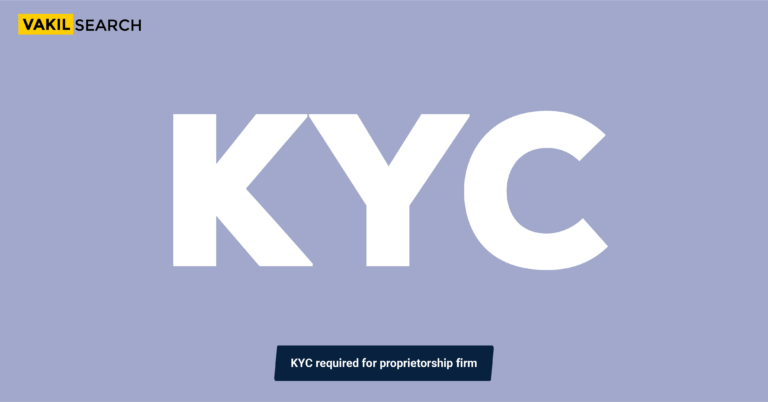Converting a company to a Sole Proprietorship in India is now easier than ever. Learn about the process, benefits and legal documents required for the conversion.
Introduction
The process of converting a business from a company to a Sole Proprietorship is becoming increasingly popular in India. According to the Ministry of Corporate Affairs (MCA), over two million companies were converted to Sole Proprietorships in 2019 alone. This trend is due to the numerous advantages of becoming a Sole Proprietorship, such as simplified business registration and fewer paperwork requirements. In this blog, we will discuss the process of converting a company to a Sole Proprietor In India, and the benefits of doing so.
VakilSearch helps you convert a Sole Proprietorship to a Private Limited Company. VakilSearch is an online legal services platform that provides a range of services to individuals, companies and organisations. The services include entity formation, corporate compliance, trademark registration, patent registration, legal document drafting and litigation support. FamilySearch makes it easy for users to access the legal services they need, without having to pay hefty legal fees.
Can A Company Become A Sole Proprietorship?
Yes, a company can become a Sole Proprietorship in India. A Sole Proprietorship is the simplest and most common form of business entity, where one person owns and operates the business. It is a very easy and cost-effective form of business to set up as it requires minimal paperwork and there is no separate legal entity. The owner of the business is liable for all debts, losses, and liabilities of the business. The registration process is simple, the owner has to get a Goods and Service Tax Identification Number (GSTIN) and open a current bank account in the name of the business. The owner also has to register the business under the Shop and Establishment Act of the relevant state. Once the registration is completed, the owner can begin operations.
Benefits of Sole Proprietorship over Company
Starting a business is a great way to bring your ideas to life and make a living doing something you are passionate about. If you want to run a business on your own, then a Sole Proprietorship is a great option. This type of business entity is owned and operated by a single person who is solely responsible for all the decisions and liabilities of the business. There are many advantages to setting up a Sole Proprietorship, such as,
- Simplified Registration: In comparison to companies, registering a Sole Proprietorship is much simpler and less time-consuming. All that is required is to register the business with the local authorities.
- Fewer Legal Requirements: Sole Proprietorships do not have to meet stringent legal requirements such as filing annual returns, maintaining statutory books of accounts, conducting board meetings, etc., as is the case with companies.
- Limited Liability Protection: The owner of a Sole Proprietorship is personally liable for all the debts of the business. This means that the owner’s assets are protected from any legal action taken against the business.
- Tax Advantages: Sole Proprietorship businesses are taxed at the personal income tax rate of the owner, which is lower than the corporate tax rate applicable to companies.
- Easy to Operate: Sole Proprietorships are easy to operate and require minimal paperwork. They do not need to appoint directors, and the owner can take decisions without having to seek the approval of anyone else.
Process of Converting a Company into Sole Proprietorship
Converting a company into a Sole Proprietorship is a great way to simplify the business structure and reduce the administrative costs associated with operating a company. However, certain steps must be taken to ensure a successful conversion. This guide will provide an overview of the process of converting a company into a Sole Proprietorship, from determining the business structure to filing the necessary documents.
Step 1: Determine Business Structure:
The first step in converting a company into a Sole Proprietorship is to decide which business structure is best suited for the company. A Sole Proprietorship is the simplest and most common form of business structure in India. This type of business is owned and managed by one individual and is not required to register or incorporate with the government.
Step 2: Draft Memorandum of Understanding:
After deciding the business structure, the company should draft an agreement between the company and the sole proprietor. This agreement should clearly define the roles and responsibilities of the sole proprietor, the company and the shareholders. The agreement should also include the financial details of the conversion, such as the amount of capital invested and the profits to be shared between the company and the sole proprietor.
Step 3: Prepare Legal Documents:
The next step is to prepare the legal documents that will be required for the conversion. This includes the Memorandum of Association, Articles of Association and the Shareholders’ Agreement. All these documents should be prepared under the Companies Act 2013 and should be approved by the shareholders.
Step 4: Amend Company’s Memorandum of Association:
After the documents have been prepared, the company should then amend the Memorandum of Association to reflect the changes in the ownership structure. This amendment should be approved by the shareholders.
Step 5: Register the Change in Ownership:
After the company has amended its Memorandum of Association, the next step is to register the change in ownership with the Registrar of Companies. The company will have to submit the amended documents along with the necessary fees.
Step 6: Amend Company’s Articles of Association:
After the change in ownership has been registered with the Registrar of Companies, the company should then amend its Articles of Association to reflect the new ownership structure. The company should then submit the amended documents to the Registrar of Companies.
Step 7: Appoint Board of Directors:
After the Articles of Association have been amended, the company should then appoint a Board of Directors. The Board of Directors should be composed of at least three members, with one member being the sole proprietor.
Step 8: Open a Separate Bank Account:
After the Board of Directors has been appointed, the company should then open a separate bank account for its Sole Proprietor In India. This bank account should be used to manage the company’s finances and should be kept separate from the company’s other accounts.
Step 9: File Tax Returns:
The company should then file its tax returns for the new Sole Proprietor In India. The tax returns should be filed with the appropriate tax authorities and should include all the income that the Sole Proprietorship generates.
Step 10: Update Company Records:
The last step is to update the company’s records to reflect the new ownership structure. This includes updating the company’s books of accounts, shareholder registers and other documents. The company should also update its website and other online accounts to reflect the new ownership
Conclusion
Converting a company to a Sole Proprietorship is a simple and cost-effective way in India to run a business. The process involves minimal paperwork and allows the owner to be in full control of the business. The Sole Proprietorship also comes with benefits such as limited liability protection, tax advantages, easy-to-operate and close quick decision-making, and personal satisfaction. Therefore, it can be concluded that converting a company to a Sole Proprietor In India can be a great way for entrepreneurs to start their businesses in India.
Are you ready to convert your Sole Proprietorship into a private limited company? Connect with VakilSearch, and get started today to take advantage of the many benefits of a private limited company, such as Limited Liability Protection, Tax advantages and ease of operation. With our experts by your side, the conversion process is hassle-free and quick. Call us now to get started!
Read more:










